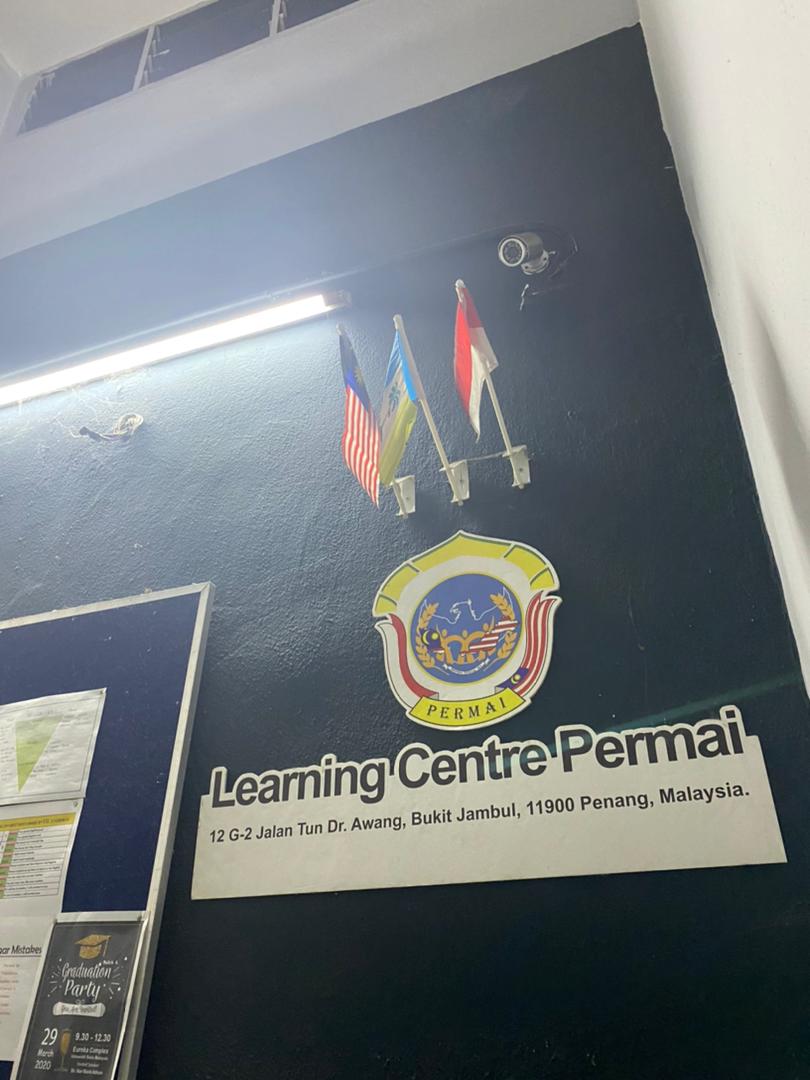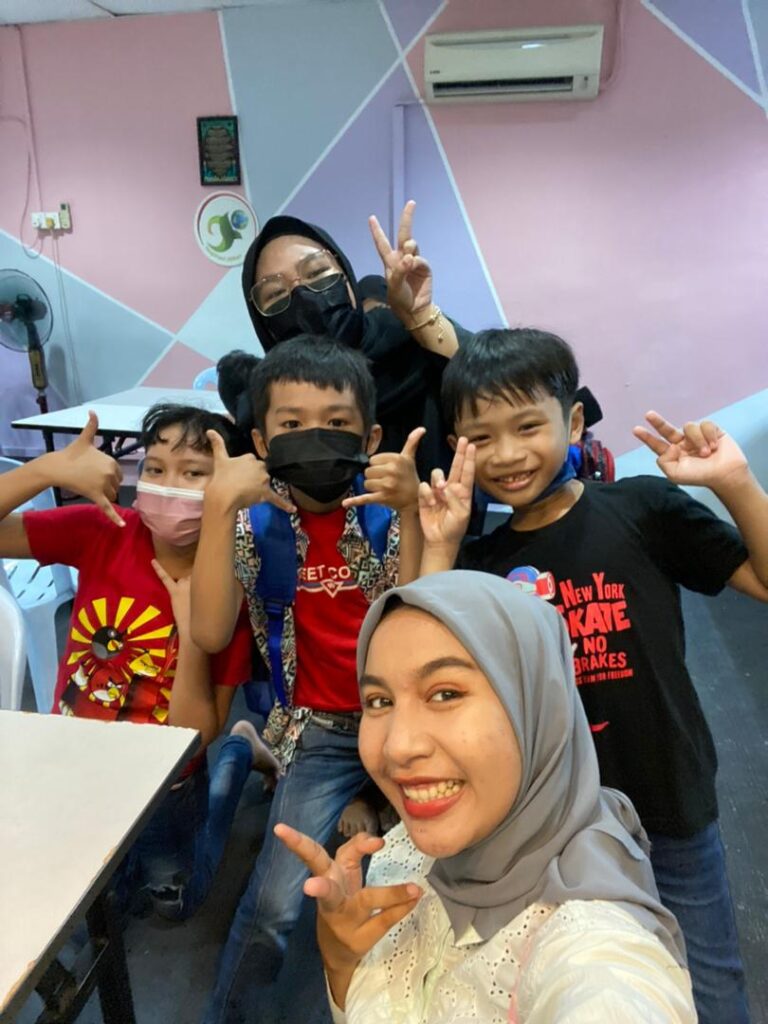In this first installment of Humans of IISMA, Ayunda shared her teaching experience in PERMAI, a community that seek to assist Indonesians in various social and education activities in Penang.

It’s already 11 am. Time to go home. All students have been picked up by their parents, except Chacha. She sits alone on her chair playing with her beads bracelet.
I approached her. “Has your mom not come yet to pick you up, Cha?”
“Mama said she’s going to pick me up at 2 pm when she’s back after work,” she said. “If you want to go home, just go, Ustadzah. I am used to it.”
Hearing that sends a twinge to my heart. “No problem,” I said, deciding to accompany her while waiting for her mom. “Let’s play together while waiting for your mom.”
This is a usual scene at PERMAI Penang, a community in Penang, Malaysia that is founded to assist Indonesians in Malaysia—particularly in Penang—with various activities in social, cultural, education, and training fields.
Formed in 2019 by Khosaini and their Indonesian colleagues, the community is registered on Jabatan Pendaftaran Pertubuhan Malaysia (JPPM) Pulau Pinang. Their activities include bonding with Indonesians, holding a Qur’an recitation, English training, and serving as an Indonesian education frontline for children who are constrained by the availability of documents to register for school in Malaysia.
According to the Badan Nasional Penempatan dan Perlindungan Tenaga Kerja Indonesia (BN2PTKI), Malaysia has been the top destination for Indonesian migrant workers since 2017. March 2019, BN2PTKI reports data on the placement of Indonesian workers in Malaysia, amounting to 19.695 workers. Despite being a foreign exchange hero for the country, the numbers of illegal Indonesian migrant workers or Tenaga Kerja Indonesia (TKI) in Malaysia are quite high.
Problems arise when they decide to get married in Malaysia, since the Malaysian government does not allow migrant workers to get married in Malaysia. TKIs face many challenges with marriages that are not registered with the Office of Religious Affairs, or Kantor Urusan Agama (KUA): so many TKIs carry out Sirri weddings in the presence of their closest relatives and Ustadz. Sirri marriage is a marriage between a couple that is not registered at KUA, although it is fulfilled through the elements of marriage in Islam. Children from the marriage are born without a birth certificate, so they are rejected from registering for passport and school enrollment (Faizin, Alfitra, & Mansur, 2018).
This condition is what motivates Khosaini, also known as Pak E, to build PERMAI Penang.
“Their parents are probably so busy working that they don’t have time to teach the children those kinds of values,” said Ustadzah Yus, the only teacher they have, to me. “Thank you very much for helping us. It means a lot.”

I cannot imagine how tough it is to handle kids from different backgrounds alone. Since then, I decided to come every week to help Ustadzah Yus and PERMAI Penang. It is incredibly exciting since I was given the opportunity to teach English for second grade students right away. Even though I only volunteer for two hours per week, the experience I had was incredible.
Waking up so early to catch a Rapid Penang Bus to Bukit Jambul, going back to my dormitory at 1 pm, facing language barriers, and dealing with students from different backgrounds are the challenges that I face every week. My weekend routine has increased, not only finishing my assignments, but also being a teacher for them. Not only did I teach them the lesson, but I also gained an amazing experience. Their laughter and tears will be missed.
The lessons are the same as what Indonesians learn at school: sciences, social sciences, math, English, Indonesian, Islamic studies, Pancasila, civic education, and so on. They also learn reciting and memorising Qur’an.
It is hard for the kids here to understand three languages at once: Malay, Indonesian, and English. Malay was used as their daily language to communicate, meanwhile Indonesian and English as their lesson.
Once, a kid asked me in Malay-accented Indonesian, “Ustadzah, what is ‘Monday’ in Indonesian?”
“It is Hari Senin,” I said.
“Ohh. ‘Isnin’?” The kid confirmed that Isnin is Malaysian for Monday.
“No, it’s Senin. S-e-n-i-n,” I spelled it out for them.
Aside from that, as we know, kids are always kids. Sometimes they fight over toys and argue about which one is better. When this happened, I separated them and asked them to apologize to each other, telling them to wait for their turns instead of fighting. I calmed them down with butterfly hug technique, a method of therapeutic intervention to help relax and calm a hyper-aroused self by wrapping their arms around themselves, and tapping their shoulders in an alternating rhythm while taking deep breaths.
“Ayunda, is It hard for you to handle them?” asked Ustadz Azzam, the principal, in the middle of the class.
“Yeah, but I can figure this out,” I answered. “It’s a now-or-never experience for me.”
Participating in this volunteer activity provided me with a wealth for valuable experiences. Pak E, Ustadzah Yus, and Ustadz Azzam dedicate themselves to educating the future generation, starting from door to door and becoming a source of hope for parents. They inspired me to help build Indonesia even though I was away from home.
The spirit of my students amazed me and made me grateful for all of my experiences that I have, including studying abroad with IISMA. I am delighted to be able to contribute to building Indonesia through IISMA. It may have been just one Indonesian word that they learned today, but I believe it was the start of a thousand words that can help them construct their future as the generation of Ibu Pertiwi.

Created by : Ayunda Izzatul Iman
Ayunda is an undergraduate student of Psychology with a minor in Education and Developmental Psychology at Universitas Airlangga. Taking a student exchange opportunity through IISMA at her final year has never been easy for her, yet she gained amazing experiences that not everyone can achieve. She is choosing to #BeBoldtoGoAbroad.
